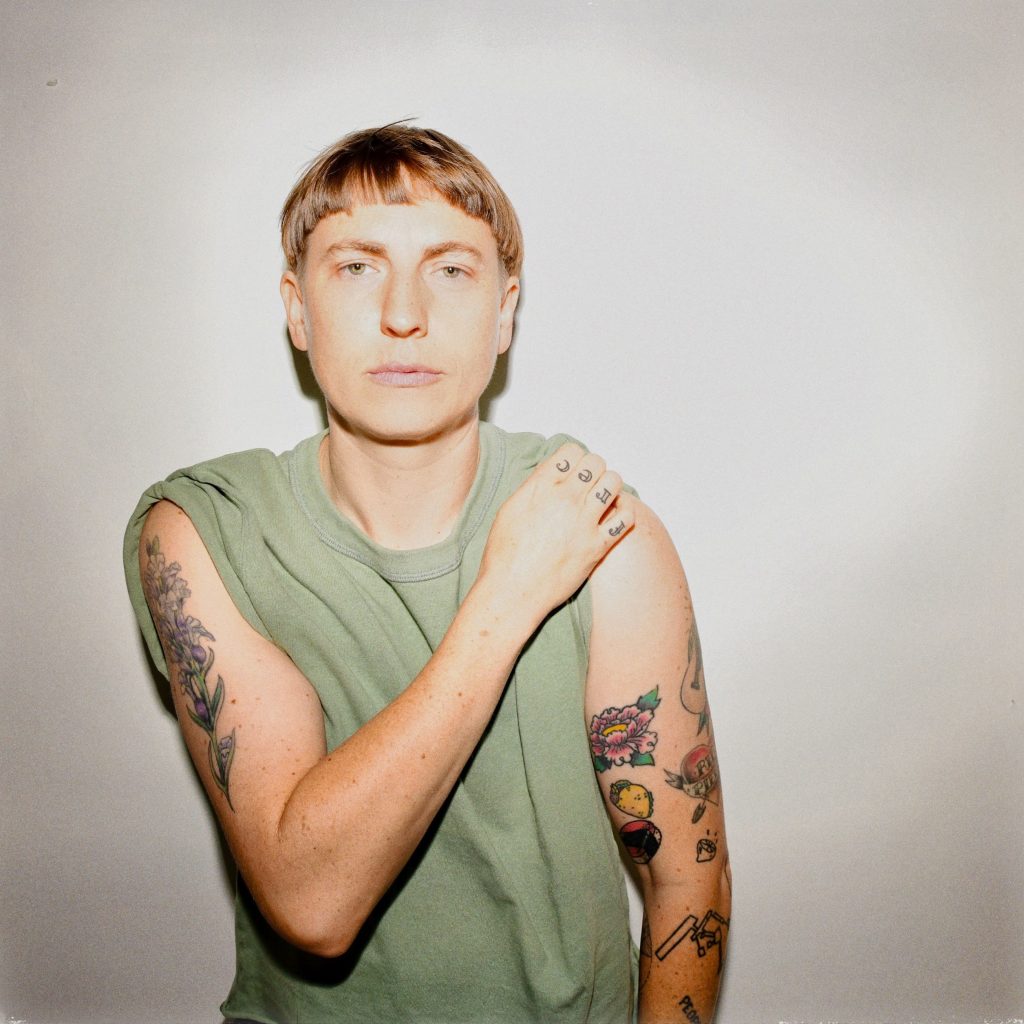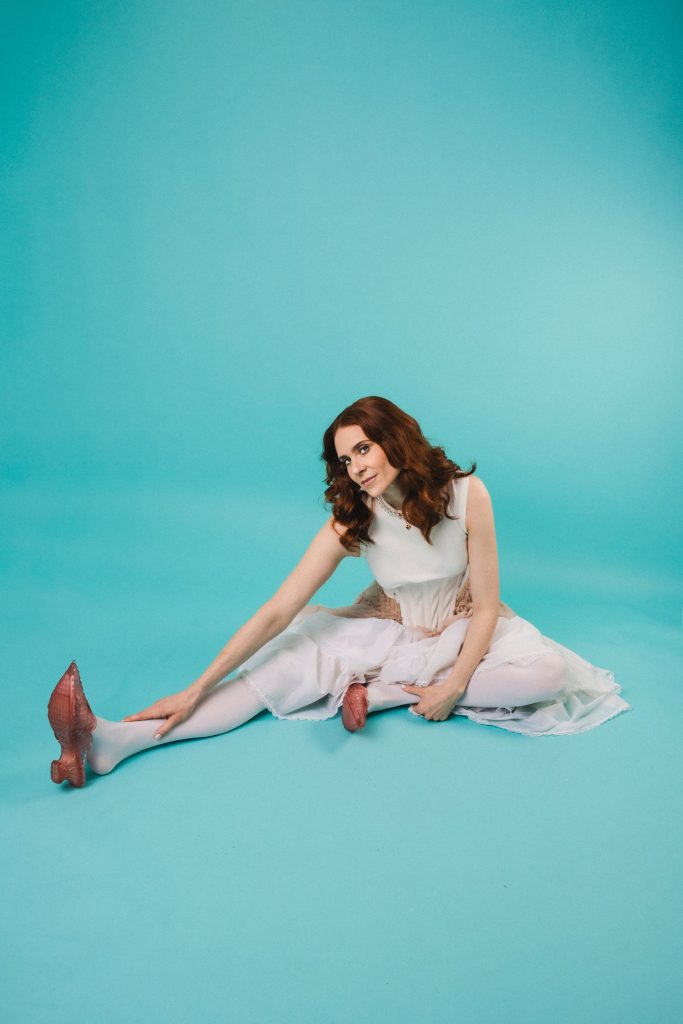
Nearly twenty years into her ever-evolving career, London and LA-based, Brit award-winning singer, songwriter, actor and activist Kate Nash has seen it all. She’s achieved huge commercial success – 2007’s debut Made of Bricks, featuring the hit single Foundations, reached number 1 in the UK and spent seven months in the top 40 – seen the darker side of the industry after being dropped in 2012 following 2010’s Bernard Butler-assisted My Best Friend Is You, forged her own path as a successful independent artist via 2013’s punk-y Girl Talk and 2018’s Yesterday Was Forever, and starred in HBO’s hit wrestling drama, GLOW. She’s also been the subject of an award-winning documentary, Kate Nash: Underestimate the Girl, and also co-created a musical, Only Gold, with Hamilton choreographer Andy Blankenbuehler. Oh, and she also starred in that too. Still only 36, Nash isn’t finished shape-shifting just yet; after signing with legendary label Kill Rock Stars, whose alumni include Nash favourites Elliott Smith and Sleater-Kinney, in early 2024, she’ll release her fifth album, 9 Sad Symphonies, in June.
Inspired by old Hollywood, vintage musicals and a desperate quest to find beauty in a rotten world, it’s another sonic shift following her “rage-y” recent output. “It needed to be cinematic and dreamy,” Nash says of the 10-track album (the title is both a joke and an ode to passing achievable goals when creativity crumbles). As for the sonic shifts, it’s just second nature: “I do things based on what I’m feeling at the time, and what I’m inspired by,” she explains.
That moment of the album’s creation was fuelled by two things; her work on Only Gold and a global pandemic that curtailed filming on the fourth season of GLOW and sent Nash – and everyone – into a tailspin. After a period of laying bed watching zombie movies, creativity started to arrive in the autumn and winter of 2020, with songs being worked on well into 2021. Having worked with Danish producer Frederick Thaae on her musical, they quickly reconnected to start work on 9 Sad Symphonies. “We were in this completely different landscape for writing songs [on the musical], which was completely freeing,” Nash explains. “I was writing for a story, I was writing about a King and a Queen and a proper story arc. In that world you need the audience to understand the songs immediately, it’s very direct, and it has lots of editing which I’d never done. It changed my outlook on songwriting. Also, we said at the beginning that we wanted to make something beautiful, nothing harsh. I’ve done a lot of harsh stuff before. We wanted loads of beautiful string arrangements.”
These melodic, bright-on-the-surface but deeply layered songs started to emerge out of creative scenarios that had been completely changed by the pandemic. “We were on Zoom, which was… challenging,” she laughs. “We discussed ideas and then we’d hang up on Zoom, go away for three hours, or Frederick would send me the small thing we’d started, then I’d start writing and doing melodies and lyrics, and he would do production, and then we’d meet up on Zoom later.” Slowly the songs started to evolve, their unusual creation adding intriguing problems to try and overcome. “We’d get stuck a lot but you just had to let the stress go and come back to it. It’s a different version of the album to the one we would have made normally.”
The album’s curtain raiser, Millions of Heartbeats, sets out the album’s lyrical themes perfectly. “It’s about that point in the pandemic where I had lost my spark for life,” she says. “And I’m a pretty sparky person, so it was really sad to me.” She references the lyric “the spark is lit at such a low flame” as a crucial moment. “I felt like I lost a part of myself. I didn’t know how to get it back.” As with all of the songs on the album, it’s not just about one thing, however. “I think it also sums up a lot of how I feel about how people act in the world right now. Am I a number or am I a person? What are we trying to be right now? I’m a human being. But we’re so quantifiable and packaged and everyone is a brand. We’re in this capitalist explosion and I feel the effect of it in a way I’ve never felt before.” But it’s also a song that, by its end, flickers with a light that can’t be completely put out. “At the end of the day, the world is beautiful, there are all these heartbeats out there, and there is hope,” she says with a smile. “We have to try! You can’t fucking give up. This song is a sign of what’s to come – there’s going to be darkness and depression but we’ll get to hope by the end.”
A rare guitar appears on Ray, which delves deeper into mental health struggles, detailing depression and anxiety. It’s a theme Nash is keen to share with her fans in a typically honest manner. “It’s natural for an artist to write about emotions and feelings and darkness,” Nash says. “Also a lot of my fans suffer from depression too and I noticed it more when I was doing my livestream chats over lockdown. Not talking about it is not the solution. Being open and creating that community within my fanbase is really important.” It’s one she’s fostered not only via the Kickstarter campaigns that funded Girl Talk and Yesterday Was Forever, but also her Patreon account which she used in the pandemic to connect with her loyal fans via livestreams.
That darkness also weaves through Misery, which marries a propulsive string arrangement and a buoyant beat to lyrics that try to outrun the emotion of its title, while the livid My Bile is an emotional exorcism married to beatific strings and crashing drums. “I guess that song is the little patience I have left to give to all the bullshit, all the shitty parts of the industry, the media, the way people talk to other human beings, me as a woman in the industry, all the things people say about you online,” she explains. “I’m done. I don’t have anything left to give to that. I’ve proved who I am with actions, which is more important. I just have bile left.” There’s love on the album too, specifically on Space Odyssey 2001, which recounts a first proper date with her now partner. On the surface it feels like a diss of the Kubrick classic, 2001: Space Odyssey, but is more about its poor choice given the context. “It’s the wrong film for a date,” she smiles, “but I love the film. I like making jokes in songs. I like that there’s this beautiful love song but it’s also complaining about this critically acclaimed film being too long. I don’t recommend it for a first date!”
While the album was finished at the end of 2021, Nash wasn’t sure what to do with it. Free from the typical record industry framework – no manager, no label, no booking agents – she did two things; went on tour in 2022, which was rejuvenating, and joined TikTok. Her first post was a timeline of her extraordinary career, which ended with her questioning the best way in which to release the new album (some of the songs, including Misery, Wasteman and Horsie, had already started to emerge without a label). That first post went viral, leading to an influx of offers from labels and managers, creating a scenario Nash had been in before; dealing with some of the industry’s shadier characters. One label, however, had been interested for a while. “Kill Rock Stars had been pursuing me for two years. They had been checking in for a while saying ‘we notice the album hasn’t come out, we really love it’.” Once Nash had secured an excellent new manager, the loose ends were tied up and the album was ready to go.
Recent one-off single, Change, released to coincide with the signing announcement, was an example of what having a label can give you. “I didn’t have to do anything,” she laughs. “I’ve been doing everything myself, alongside my band and my tour manager and my various managers, but I am always the driving force. But it’s like you’re driving a 16 wheeler – there’s so much you have to take responsibility for. What was so nice with this release was that I just did the creative bit and the stuff I’m good at. The label takes care of everything else.”
It’s been a refreshing change to be able to fully focus on the creative side. That creativity is also there in the artwork for 9 Sad Symphonies, which features Nash in front of an old school Hollywood backdrop that recalls British nature while also alluding to Nash’s on-off home of LA. That visual world will also extend to Nash’s always incredible live shows, which are a key goal for her in 2024. “You can always push things further and take it to a new place,” she says. “So with this album I want to play really quality shows.”
On 9 Sad Symphonies, Nash has taken another huge step towards cementing her place as one of Britain’s most unique and fearless talents. “I’ve climbed through the sewers of this industry and so my goal is to make good music I believe in, to have longevity, and have good live shows,” she states. “I make a living from my music, which is awesome.” As for other ambitions and expectations, she’s been doing this long enough to know not to place your hopes in things you can’t control. “I don’t feel competitive with the industry anymore. I’ve been in the game for twenty years, and I’m in my own league now.”

Revenge Wife
Spotify Fresh Finds-cover girl, Revenge Wife is the solo project of former HOLYCHILD lead singer, Liz Nistico. In 2024 alone, she’s gone viral for videos of her performing live and exploded onto the internet. Her songs as genuine and her performance is a connection with herself, with the music and with the audience.
As the lead singer or HOLYCHILD, Nistico used their far-reaching platform to expound feminism in pop culture and further her skill set as an artist– directing all of the music videos, getting a record deal with Glassnote Records, touring the world, and playing multiple festivals.
Her past experience is why Revenge Wife feels so refined. Garnering praise from highly acclaimed publications (Paper, Flood Magazine, Substream Magazine, and Billboard) she seems to be unbothered by the onset of attention. She piqued everyone’s curiosity in the way she expressed extreme vulnerability within her lyrics, depicting heartbreak and past trauma, both in her personal life and in her time in the music industry, and combined them with an effervescent synth-pop sound.

Joh Chase (solo)
Career trajectories are rarely linear or make logical sense. Life is always unpredictable so all you can do is put in good work and keep at it. Joh Chase is a testament to this. Over the past two decades, the Seattle-raised, Los Angeles-based artist has persistently honed their songwriting and toured, opening for acts like Noah Gunderson and David Bazan. This dedication comes out entirely in their songs, which are so timeless, confident, and inviting they can only come from someone who’s devoted their whole life to their craft. Chase’s new album SOLO feels like a turning point for them: it’s the culmination of a lifetime of writing, losing, loving, and doing it all yourself. Out April 26 via Kill Rock Stars, the LP adventurously toes the line between genres and sensibilities but it’s all filtered through Chase’s charming and fully-formed vision.
Chase’s musical journey has been a winding but steady evolution. While they were raised Evangelical and originally wrote songs that grappled with leaving the church, Chase found revelations in introspective songwriting. “My brain is completely filled with the music I was raised on: Elton John, The Cranberries, Bonnie Raitt, and the Mamas and the Papas,” they say. “I will always think of my music through that template while trying to find a place for myself in the world and pushing the boundaries of that.” With that foundation, Chase’s songs are dynamic and alive. SOLO gleefully bounces from sizzling blues to bedroom-recorded folk, soaring pop, and intimate indie rock. No two tracks sound alike but they’re all connected by Chase’s patient and enduring vision.
The story of SOLO starts with the opener and single “Gone.” When Chase wrote that song during a writing session at their parent’s house in Washington state, they said it was a lightbulb moment in their craft. “Writing that was when I felt like there was new life and new energy in my songwriting,” says Chase. Listening to the track, it’s easy to see why. The song is electric, full of vitality, and simmering intensity. Over a propulsive guitar riff, they sing, “Your bed, make its covers, so they fall over every corner tight / And my body it left its mold where we laid and watched it all go down.” The instantly memorable song hits a hair-raising crescendo. After writing it, Chase used the track as a North Star for SOLO.
Though Chase has always thrived as a solo artist, part of their fuller sound comes from collaborating with bassist Marc Wolloch (Beck, AWOLNATION) and drummer Brendan McCusker (Jenny Lewis, Hellogoodbye). “I just showed them my guitar and voice demos and they just really found their own arrangements,” says Chase. “After playing just a couple of shows with them, I knew they had to make this record with me.” Chase enlisted recording engineer George Wiederkehr and mixing engineer Dan Molad (Lucius) in the studio. “If I could record a song live in a room with people, that’s my favorite way to do it,” says Chase. “While some of the songs on SOLO are just me, the ones that are full-band and recorded live. The communal energy makes the record.”
The lead single “Avalanche” exemplifies this dynamic and adventurous sound. By far the most explosive song on the LP, there’s a subtle twang in Chase’s voice as they sing, “Fever pitch of young love oriented all our stars / Found our bed in the spin of the earth and all its charge / Oh that love, that love, couldn’t see it coming, couldn’t see it coming.” Chase jokes that the song feels like blues meets Brandi Carlile. “This song is about the transformational power of love in that it’s not what you think it is all the time, they say. “I feel like it really represents my life. It’s very personal for sure.” SOLO boasts euphoric, sing-along-ready choruses and warm arrangements, all anchored by Chase’s inviting croon. Songs like “To Forget You” have a tangible vitality while “Savina,” a track that Chase originally wrote in 2008, boasts an obvious effortlessness.
Chase thrives on perceptive and emotionally resonant insight: they’re able to pinpoint a feeling with staggering clarity even on the lighter moments. Single “When I Got This Place” encapsulates this in an affecting and funny ode to love and heartbreak in Los Angeles. “The whole song really represents that I’ve had a lot of breakups in LA,” says Chase. “Every scene that’s in the song is a moment that’s happened in my life.” On the track, Chase sings, “Don’t need a lover in Los Angeles / everybody’s here for show biz.” It’s a clever line but it’s not a throwaway. At the end of the song, Chase sings “a bunch of dreamers trying to find some space” with the line showcasing how the personal can be universal.
SOLO is a testament to Chase’s do-it-yourself ethos throughout their entire career—they chipped away, self-funded tours, and crowdfunded this LP. But by finding their voice, they now no longer feel alone. “This is the most support I’ve ever had in my life,” says Chase. “I do not feel alone at all. There’s so much energy and generosity here around these songs.” Though it’s not their debut, SOLO feels like a reinvention for an artist: a daring reintroduction for a timeless talent. “I spent my life making music and trying to do it about 10 different ways,” says Chase. “Now this one feels like it. This album feels like a leveling-up of my music in general. When I look at it now, I realize this is the first record that’s really me.”



